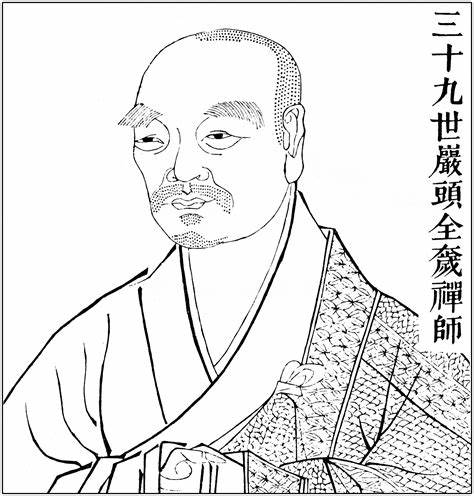Bodhidharma
Baizhang Huaihai
Caoshan Benji
Dahui Zonggao
Daman Hongren
Danxia Tianran
Dayi Daoxin
Dazhao Puji
Dazhu Huihai
Dazu Huike
Deshan Xuanjian
Dongshan Liangjie
Dōgen
Eisai
Guifeng Zongmi
Guishan Lingyou
Guizong Zhichang
Heze Shenhui
Hongzhi Zhengjue
Huangbo Xiyun
Huanglong Huinan
Huineng
Jinshan tanying
Linji Yixuan
Longtan Chongxin
Luohan Guichen
Mazu Daoyi
Nanquan Puyuan
Nanta Guangyong
Nanyang Huizhong
Nanyue Huairang
Niutou Farong
Qingliang Wenyi
Qingyuan Xingsi
Sengcan
Shishuang Chuyuan
Shitou Xiqian
Tianhuang Daowu
Xiangyan Zhixian
Xitang Zhizang
Xuansha Shibei
Xuedou Chongxian
Xuefeng Yicun
Yangqi Fanghui
Yangshan Huiji
Yantou Quanhuo
Yaoshan Weiyan
Yongjia Xuanjue
Yongming Yanshou
Yunmen Wenyan
Yunyan Tansheng
Yuquan Shenxiu
Zhaozhou Congshen
Index
Yantou Quanhuo

born
?
died
887
religion
Chan
teacher
DeShan Xuanjian
Contents
Life
OutStanding Master
Life
Yantou Quanhuo (?-887) was a disciple of Deshan Xuanjian. He came from Quanzhou. His family name is Ke. He was handsome and broad-minded with casual personality at younger age. He first learned from Qingyuan Yigong, later went to Baoshou Temple in Chang'an to receive ordination and studied the scriptures. After finishing study, he traveled to vaious monasteries. He was a close friend and important early mentor to Master Xuefeng Yicun. He died Guangqi third year.
OutStanding Master
Te-shan had only a few disciples, of whom two stood out: Yen-t'ou Ch'üan-huo (828-887) and Hsüeh-feng I-ts'un (822-908). In spiritual gifts, Yen-t'ou was superior to Hsüeh-feng. Yen-t'ou's mind was sharp as a razor. He never deferred to anyone, not even Te-shan and T'ung-shan. One day, as he came to see Te-shan, no sooner had he stepped into the door than he asked, “Is it holy or profane?” As Te-shan shouted, Yen-t'ou did obeisance. Later, when someone related the incident to T'ung-shan, the latter remarked, “Anyone else than Yen-t'ou would have found it hard to respond so well.” When Yen-t'ou heard of this compliment, he said, “The old man of T'ung-shan is very insensible to have passed such an erroneous judgment. He does not know that on that particular occasion, in acting the way I did, I was uplifting him (Te-shan) by one hand while pinching him by the other hand.”
In asking, “Is it holy or profane?” Yen-t'ou was, of course, referring to that state in which there is no more distinction between the holy and profane. In shouting at the question, Teshan made him understand that he saw eye-to-eye with him. In doing obeisance, he was on the one hand showing his delight at the master's reaction, but on the other hand he was testing how he would react. But poor Te-shan sat like an idol and accepted unsuspectingly a homage which was meant for the merely “holy”!
Yen-t'ou's radical transcendentalism finds an illustration in another episode. As he was chatting with his friends Hsüeh-feng and Ch'in-shan, Hsüeh-feng suddenly pointed at a basin filled with plain water. Ch'in-shan remarked, “When the water is clear, the moon appears.” Hsüeh-feng said, “When the water is clear, the moon disappears.” Yen-t'ou said nothing, but, kicking off the basin, went away.
In this episode, it is clear that Ch'in-shan's approach is positive, while Hsüeh-feng's is negative. But what is the big idea of kicking off the bowl? Probably, Yen-t'ou wished by his act to indicate the need of transcending both the positive and negative. Yen-t'ou often spoke of the “last word,” which, in his view, few Zen masters understood. Can it be that his kicking in this case is the last word? Anyway, he very seldom if ever allowed another to say the last word.
Contact us
Disclaimer
Comments
© Copyright Jumpypixels.com